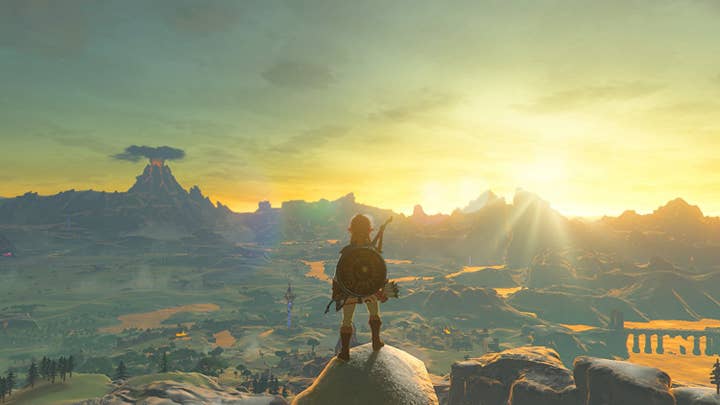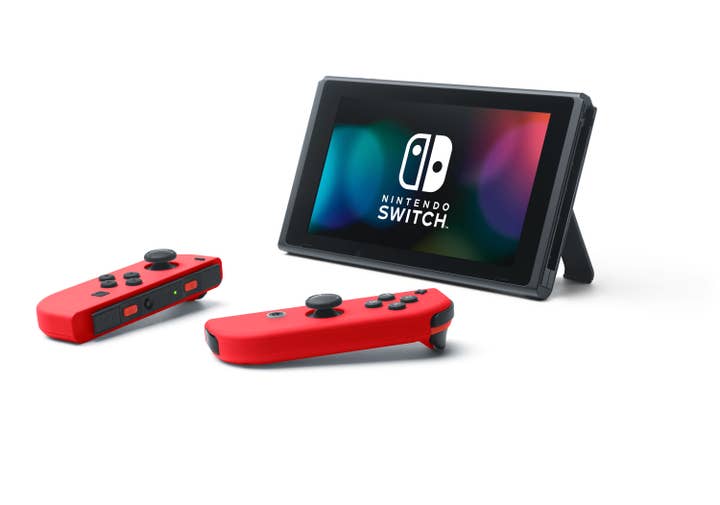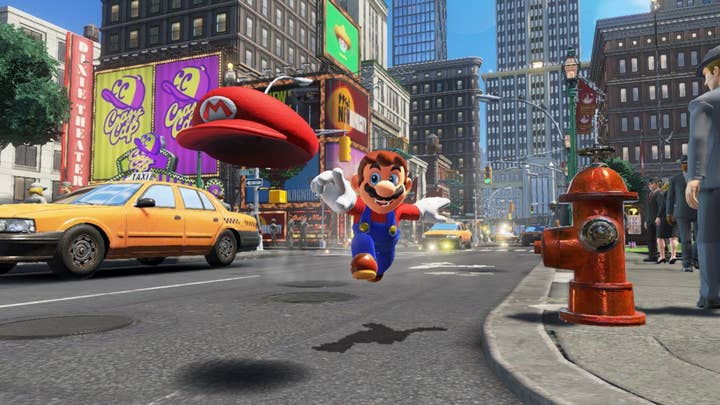People of the Year 2017: Nintendo
The platform holder has reversed its misfortunes over the course of an incredible year, but can it maintain that momentum in 2018 and beyond?
There will have been no doubt in the minds of GamesIndustry.biz readers that Nintendo would make our People of the Year list in 2017.
It's fair to say things looked bleak for Nintendo prior to Switch's launch. While many an industry mouthpiece has prematurely predicted the demise of the Japanese platform holder, this time last year the situation looked particularly grim for the firm.
Still suffering from the failure of the Wii U and the slowdown of the 3DS, Nintendo waited a shockingly long time before unveiling its next console, only offering a teaser trailer six months before launch and a full unveiling with just two months to go. Even die-hard Nintendo fans were questioning whether the company's gamble on a console-handheld hybrid would pay off.
But as the old adage goes: don't write off Nintendo.
The Switch is on course to ship up to 16m units by the end of its first year, the likes of Mario and Zelda are among the highest rated games of 2017, and even the nostalgia-tapping SNES Classic was outselling Xbox One and PS4 for weeks after launch.

Game Investor Consulting founder Nick Gibson describes 2017 as "a turnaround year for Nintendo, a year in which Nintendo proved its many doubters wrong."
He continues: "There was substantial scepticism within the industry about Nintendo's ability to remain a console manufacturer following the relative failure of the Wii U and the decline in its handheld business in the face of massive mobile competition. Switch's performance has exceeded most industry analysts' expectations and quite probably most within the industry. Nintendo may have diversified its model to start having its IP offered on mobile but this is simply supplementary to its core console business which now appears to be back in rude health."
SuperData's Joost van Dreunen adds: "The company is back on top after investor sentiment was starting to sour. Not only that, but the current success of the Switch reminds everyone who thought that mobile gaming would simply decimate Nintendo that even such a behemoth is capable of a powerful comeback.
"Nintendo has proven many of the newcomers wrong. Making truly great gaming experiences is not just a function of analytics and digital distribution. It also involves magic."
Joost van Dreunen, SuperData Research
"Now that the games industry is more mainstream, a lot of people new to the industry have opinions about what makes this market work. Nintendo has proven many of the newcomers wrong. Making truly great gaming experiences is not just a function of analytics and digital distribution. It also involves magic."
IHS Markit director Piers Harding-Rolls observes that Switch owes much to its failed forebear. It serves as the natural evolution for Nintendo's vision of a competent hybrid device during a time "when many, I included, questioned the need for such a device."
"This followed a partially realised implementation of this product strategy with the Wii U, which had failed hard," he explains. "Nintendo has learnt a number of key lessons from the Wii U strategy and put those hard lessons to immediate use with the Switch."

Hardware sales alone do not a success make - it's the software line-up that has driven and maintained Switch's momentum throughout the year. At first, the understated launch looked to be lacking in must-have software beyond Zelda (even tech demo collection 1-2-Switch failed to inspire the same enthusiasm as Wii Sports and NintendoLand before it).
But the arrival of Mario Kart 8 Deluxe, Arms, Splatoon 2, Pokken Tournament DX and Ubisoft crossover Mario + Rabbids: Kingdom Battle ensured a major first-party release (Rabbids, while third party, still benefits from Nintendo's biggest IP) almost every single month throughout the summer, all building up to the arrival of the acclaimed Super Mario Odyssey in October.

It's a cadence few newly-launched consoles, let alone Nintendo ones, have ever enjoyed and something Gibson attributes to "either a remarkable degree of luck or, more likely, exceptional management and execution by Nintendo's development division."
Harding-Rolls agrees, adding: "Nintendo has delivered a formidable collection of first-party games on Switch, making it a must buy for many console gamers. Sure, Switch is interesting hardware, but it is the content that really makes it sing."
It's not just the quantity of these releases, but the quality. Mario Kart and Pokken may be Wii U ports, but they are still polished games and poor sales of their original platform means they may well have been new discoveries for many Switch users. Arms is an inventive new IP, Splatoon 2 a follow-up to Nintendo's biggest new property in years, and Zelda has been picking up Game of the Year awards for its dramatic (and much-needed) reinvention of a series that dates back 30 years.
It's this evolution of Nintendo's key franchises that helps the firm continue to draw in millions of consumers, says van Dreunen.
"Sure, Switch is interesting hardware, but it is the content that really makes it sing."
Piers Harding-Rolls, IHS Market
"Serialisation and sequels are a common practice for any entertainment firm," he says. "But Nintendo has done an exceptional job at innovating on its tried-and-true formulas without alienating its user base. Titles like Zelda: Breath of the Wild and Super Mario Odyssey are the rare exception of an empire like Nintendo - and one that is publicly traded at that - constantly pushing the boundaries to cater to its audience."
That's not to say Switch has enjoyed a perfect first nine months. In an age where consumers are increasingly demanding connected experiences, the relatively limited online multiplayer modes of Mario Kart and Splatoon 2 (not to mention the ludicrous set-up for voice chat in the latter) show that Nintendo still has a way to go when it comes to satisfying modern audiences.
"Nintendo has made limited progress in terms of its online business and has delayed its subscription service launch to 2018," says Harding-Rolls. "I think this is one area Nintendo really has to up its game."

As crucial a year as 2017 has been for Nintendo, it cannot afford to lose momentum in 2018. So far, the only major first-party releases confirmed for the next twelve months are Yoshi (not exactly a system seller) and the promise of a brand new Pokémon game.
ICO Partners' Thomas Bidaux observes that while the growing number of third-parties supporting Switch may help, Nintendo needs to balance out its own portfolio.

"The curation of their catalog is probably one of the big challenges for the new year," he adds. "While opening up to more studios was a boon for the industry and many developers, we are already seeing signs that Nintendo might have opened the doors too wide and should pay more attention to some of the titles launched on the Switch. As they open up, they will face the delicate balancing act of making sure the games are numerous, diverse and of quality."
Gibson agrees, stressing that Switch's future performance depends on "software, software, software."
"Switch's success so far is down to a combination of hardware quality and innovation plus some amazing releases so far but long-term console market success is almost entirely driven by software," he says. "Nintendo could carry this entirely by themselves but to maximise the momentum they are going to need to get the big third-party publishers on board, too. Unfortunately they still have work to do in this area."
While Switch ports Wolfenstein II and LA Noire have been big wins for Nintendo - particularly as they show a massive shift in support from publishers that have previously avoided its platforms - it is the smaller studios that may prove to be a significant force in taking the new console forward.
We've already covered at length how well indies are treated by Nintendo today, and that many are securing more sales on Switch than all previous platforms combined. It's therefore vital that Nintendo ensures the console remains accessible to up-and-coming studios.
"Switch managed to open up like no other Nintendo console before when it comes to third-party developers - especially independent ones. This is a very important shift for them"
Thomas Bidaux, ICO Partners
"We're seeing a growing number of small and medium-sized game developers get a lot of traction on the Switch," says van Dreunen. "The indie scene is an important driver of innovation for the industry at large, and I expect to see Nintendo stepping up its third-party efforts to extend its library and build up its offering."
Bidaux agrees: "Switch managed to open up like no other Nintendo console before when it comes to third-party developers - especially independent ones. I think this is a very important shift for them, and a sign that they are following the trends and know how to go with them, a behaviour they haven't showed in the past."
There is already talk of Switch potentially matching if not surpassing sales of the original Wii. It's easy to be skeptical about this - Switch has, so far, primarily appealed to Nintendo's core fans and a more traditional audience, not the broader demographic that powered its most successful devices. Yet, the portable nature opens the possibility of multi-Switch households, not only increasing the sales potential but also exposure to that wider audience Nintendo no doubt hopes to recapture.
"The next step for Nintendo is translating this early adopter, core audience momentum into a broader proposition for other consumers," says Harding-Rolls. "My view is that this starts to become important during summer next year when console markets are generally quiet, the initial launch fever is over and most early adopters have already bought into the Switch experience."

It's not all about Switch, of course. The release slate may be quieting down on 3DS (although nowhere near as you might think given the age of the machine) but Nintendo is still ramping up its efforts on mobile.
This year, the firm has released Fire Emblem Heroes to moderate success and recently launched Animal Crossing: Pocket Camp, as well as continually experimented with Super Mario Run. Granted, there have been stumbling points in its mobile strategy so far but analysts do not expect the platform holder to withdraw from the space any time soon.

"Nintendo's growing presence on mobile will be important to keep an eye on," says Bidaux. "Super Mario Run has been a success if you consider its reach, but the revenue it generated is not very impressive. Fire Emblem Heroes is on track to be a strong on-going mobile F2P success. Animal Crossing Pocket Camp has received very mixed reviews, with many fans of the franchise disappointed by the game's shallowness and its aggressive monetisation.
"As far as that space of the industry is concerned, it doesn't seem that Nintendo has found its own sweet spot yet, and it might take them a while to find the balance between the game experiences they want to provide, and the monetisation that fits them."
Harding-Rolls adds: "Nintendo is still experimenting with mobile games and its licensing strategy and there has been significant progress in 2017 in both of these areas. With monetisation of Nintendo's mobile games a little hit and miss, I believe it needs to build out a portfolio of games to generate a significant amount of revenue from this part of the market, a bit more like EA's approach. So steady progress in my view will be releasing some more titles in 2018 and adding to the existing portfolio."
Ultimately, things are still looking brighter for Nintendo than they have in almost a decade. Within just nine months, any bitterness caused by the disappointing Wii U has all but evaporated and Switch is firmly establishing itself as the second console of choice - if not first for those with limited time to play video games at home. Some of the GamesIndustry.biz team have spent as much time - if not more - with their Switch this year than the high-end, uber-powerful rival consoles sitting under our televisions.
The original Wii unquestionably remains the high point of Nintendo's video games business to date. There were questions as to whether the firm could ever follow that up, and Switch may well be the answer.
"Nintendo's share price is almost double where it was at the end of 2016," Gibson concludes. "It has returned to levels last seen in 2007-08 and while it hasn't matched that era's peak, there is clearly a great deal of expectation by shareholders that Switch is a major growth-driver for Nintendo. With some already talking of Switch exceeding Wii's lifetime sales of 100m+, Nintendo will need to keep its messaging under control to prevent the sort of share price collapse that it suffered in late 2008 when it started to become clear that the massive, early Wii sales momentum wouldn't be maintained."
